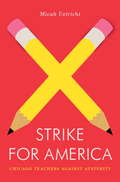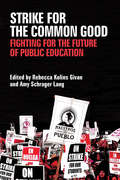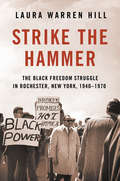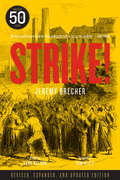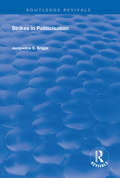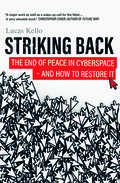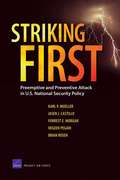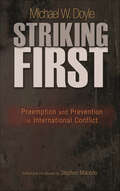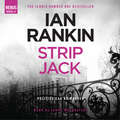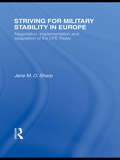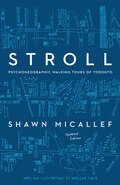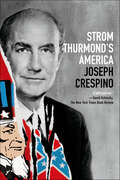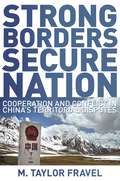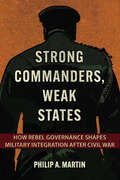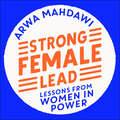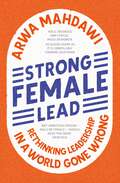- Table View
- List View
Strike Force Alpha: Strike Force Alpha, Strike Force Bravo, Strike Force Charlie, And Strike Force Delta (Superhawks #1)
by Mack MaloneyFrom the bestselling author of the Wingman series comes the first book in an action-packed series featuring the Superhawks, an ultrasecret team of patriotic US military specialists who declare war against every terrorist connected to the attacks of 9/11 Their mission was to kill bin Laden. They wound up saving the world. Assembled by mysterious superspy Bobby Murphy, trained by the best and ignoring the generals and the politicians, the Superhawks become America's ruthless answer to the post-9/11 reality. Hidden aboard the Ocean Voyager, a floating airbase disguised as a rusty containership, this ultraelite unit of assault troops carries out brazen, daring raids all over the Persian Gulf as it seeks its number-one target: al-Qaeda's master mission planner. When chatter comes in about the Next Big Thing, it's up to the Superhawks to strike out with all their fury to stop the deadliest terrorists in history from taking out the free world.
Strike Force Bravo: Strike Force Alpha, Strike Force Bravo, Strike Force Charlie, And Strike Force Delta (Superhawks #2)
by Mack MaloneyThe counterterrorism battle shifts to Southeast Asia in the second explosive Superhawks thriller from Mack Maloney, bestselling author of the Wingman series A terrorist cell with direct links to al-Qaeda's leader captures Singapore's Tonka Tower Hotel, one of the world's tallest skyscrapers. The terrorists contact dozens of news organizations so the world can witness its destruction. News copters surround the building just as the Superhawks enter--rappelling from military choppers, guns blazing, disarming the terrorists' bombs seconds before they detonate. It would seem that kudos are due, but the Superhawks are supposed to be top secret. The Pentagon bigwigs are steamed and send in a team of Navy SEALs to wrangle with the Superhawks. But al-Qaeda is hatching a new plot involving Stinger missiles. Can the Superhawks stop it in time? Or will the sprawling American military bureaucracy trip itself up before they even have a chance to try?
Strike Force Charlie: Strike Force Alpha, Strike Force Bravo, Strike Force Charlie, And Strike Force Delta (Superhawks #3)
by Mack MaloneyBurned by their government, the Superhawks must take down traitors and terrorists when the global war on terror returns to America in the third book in this action-packed series by bestselling author Mack Maloney Preparing to unleash a series of attacks from the heart of America, dozens of al-Qaeda terrorists sneak into the United States under paper-thin disguises--refugees, shipwreck survivors, a team of soccer players--overcoming tight border security with help from treasonous US officials. One potential obstacle--the Superhawks--gets eliminated when the US government burns the entire team. After narrowly escaping imprisonment or worse, the Superhawks are left to die out in the cold. But rather than rolling into their graves, the men of the Ocean Voyager become ghosts. Vengeful ghosts. Alongside the mysterious Bobby Murphy, the Superhawks team up with a group of American citizens to protect the country, save thousands of innocent lives, and purge the government of high-level traitors who threaten the very freedoms we hold most dear.
Strike Force Delta: Strike Force Alpha, Strike Force Bravo, Strike Force Charlie, And Strike Force Delta (Superhawks #4)
by Mack MaloneyTrained by the best, forged in the crucible of combat, the world's deadliest counterterrorism team returns for an ultimate showdown with al-Qaeda in the fourth novel of bestselling author Mack Maloney's super-charged Superhawks series Their mission was to kill bin Laden. They wound up saving the world. Stocked with new helicopters and weapons, master spy Bobby Murphy's floating air base, Ocean Voyager, sails for one final journey. But in West Africa, a supersquad from America's premier special ops unit, Delta Force, comes under attack. Though they take out over fifty terrorists, the secret Delta Thunder team is captured. It's up to the Superhawks to invade the terrorist fortress, save the Delta Thunder guys, and flatline the "crown prince" of terrorism before he can execute the Delta team on live television.
Strike for America
by Micah UetrichtThe Chicago Teachers Union strike was the most important domestic labor struggle so far this century--and perhaps for the last forty years--and the strongest challenge to the conservative agenda for restructuring education, which advocates for more charter schools and tying teacher salaries to standardized testing, among other changes.In 2012, Chicago teachers built a grassroots movement through education and engagement of an entire union membership, taking militant action in the face of enormous structural barriers and a hostile Democratic Party leadership. The teachers won massive concessions from the city and have become a new model for school reform led by teachers themselves, rather than by billionaires. Strike for America is the story of this movement, and how it has become the defining struggle for the labor movement today.From the Trade Paperback edition.
Strike for the Common Good: Fighting for the Future of Public Education (Class : Culture)
by Amy Schrager Lang Rebecca Kolins GivanIn February 2018, 35,000 public school educators and staff walked off the job in West Virginia. More than 100,000 teachers in other states—both right-to-work states, like West Virginia, and those with a unionized workforce—followed them over the next year. From Arizona, Kentucky, and Oklahoma to Colorado and California, teachers announced to state legislators that not only their abysmal wages but the deplorable conditions of their work and the increasingly straitened circumstances of public education were unacceptable. These recent teacher walkouts affirm public education as a crucial public benefit and understand the rampant disinvestment in public education not simply as a local issue affecting teacher paychecks but also as a danger to communities and to democracy. Strike for the Common Good gathers together original essays, written by teachers involved in strikes nationwide, by students and parents who have supported them, by journalists who have covered these strikes in depth, and by outside analysts (academic and otherwise). Together, the essays consider the place of these strikes in the broader landscape of recent labor organizing and battles over public education, and attend to the largely female workforce and, often, largely non-white student population of America’s schools.
Strike the Hammer: The Black Freedom Struggle in Rochester, New York, 1940–1970
by Laura Warren HillOn July 24, 1964, chaos erupted in Rochester, New York. Strike the Hammer examines the unrest—rebellion by the city's Black community, rampant police brutality—that would radically change the trajectory of the Civil Rights movement. After overcoming a violent response by State Police, the fight for justice, in an upstate town rooted in black power movements, was reborn. That resurgence owed much to years of organizing and resistance in the community.Laura Warren Hill examines Rochester's long Civil Rights history and, drawing extensively on oral accounts of the northern, urban community, offers rich and detailed stories of the area's protest tradition. Augmenting oral testimonies with records from the NAACP, SCLC, and the local FIGHT, Strike the Hammer paints a compelling picture of the foundations for the movement. Now, especially, this story of struggle for justice and resistance to inequality resonates. Hill leads us to consider the social, political, and economic environment more than fifty years ago and how that founding generation of activists left its mark on present-day Rochester.
Strike!
by Jeremy Brecher(Revised and Updated Edition) This book opens up detailed history of American labour .The dramatic story includes massive and often violent revolts by ordinary working people- told from the eyes of rank-and-file workers who lived it.
Strike!: Fiftieth Anniversary Edition (South End Press Classics Ser. #Vol. 1)
by Jeremy Brecher Sara NelsonInvolving nationwide general strikes, the seizure of vast industrial establishments, nonviolent direct action on a massive scale, and armed battles with artillery and tanks, this exciting hidden history is told from the point of view of the rank-and-file workers who lived it. Encompassing the repeated repression of workers' rebellions by company-sponsored violence, local police, state militias, and the U.S. Army and National Guard, it reveals a dimension of American history rarely found in the usual high school or college history course. Since its original publication in 1972, no book has done as much as Strike! to bring U.S. labor history to a wide audience. Now this fiftieth anniversary edition brings the story up-to-date with chapters covering the "mini-revolts of the 21st century," including Occupy Wall Street and the Fight for Fifteen. The new edition contains over a hundred pages of new materials and concludes by examining a wide range of current struggles, ranging from #BlackLivesMatter, to the great wave of teachers strikes "for the soul of public education," to the global "Student Strike for Climate," that may be harbingers of mass strikes to come.
Strikebreaking and Intimidation
by Stephen H. NorwoodThis is the first systematic study of strikebreaking, intimidation, and anti-unionism in the United States, subjects essential to a full understanding of labor's fortunes in the twentieth century. Paradoxically, the country that pioneered the expansion of civil liberties allowed corporations to assemble private armies to disrupt union organizing, spy on workers, and break strikes. Using a social-historical approach, Stephen Norwood focuses on the mercenaries the corporations enlisted in their anti-union efforts--particularly college students, African American men, the unemployed, and men associated with organized crime. Norwood also considers the paramilitary methods unions developed to counter mercenary violence. The book covers a wide range of industries across much of the country. Norwood explores how the early twentieth-century crisis of masculinity shaped strikebreaking's appeal to elite youth and the media's romanticization of the strikebreaker as a new soldier of fortune. He examines how mining communities' perception of mercenaries as agents of a ribald, sexually unrestrained, new urban culture intensified labor conflict. The book traces the ways in which economic restructuring, as well as shifting attitudes toward masculinity and anger, transformed corporate anti-unionism from World War II to the present.
Strikes in Politicisation (Routledge Revivals)
by Jacqueline E. BriggsFirst published in 1998, this book, through a combination of theoretical and empirical research, tries to advance beyond the available literature to an understanding of the links between strike activity and the political process. Although its primary focus is upon the long-term impact of the 1984/85 Miners’ Strike, it discusses other industrial settings and ‘political’ disputes. By linking the political socialisation process with strike activity in a refreshing and thought-provoking manner, this book provides an insight into why some people are more interested and involved in political activity in comparison with the population at large.
Striking Back: The End of Peace in Cyberspace - And How to Restore It
by Lucas KelloFaced with relentless technological aggression that imperils democracy, how can Western nations fight back? Before the cyber age, foreign interference in democratic politics played out in a comparatively narrow arena. The rapid expansion of cyberspace has radically altered this situation. The hacking activities of Russian military agents in the 2016 US presidential election and other major incidents demonstrate the sophisticated offensive strategies pursued by geopolitical adversaries. The West is winning the technology race – yet losing the larger contest over cybersecurity. Lucas Kello reveals the failures of present policy to prevent cyberattacks and other forms of technological aggression. Drawing upon case studies and interviews with decision-makers, he develops a bold new approach: a concentrated and coordinated response strategy that targets adversaries&’ interests and so recaptures the initiative.Striking Back provides an original solution to national security challenges in our era of intense technological rivalry.
Striking First
by Brian Rosen Forrest E. Morgan Karl P. Mueller Jasen J. Castillo Negeen PegahiRAND Project AIR FORCE studied the post-9/11 shift in U.S. defense policy emphasis toward preemptive and preventive attack, asking under what conditions preemptive or preventive attack is worth considering as a response to perceived threats. It considered the role such first-strike strategies are likely to play in future U.S. national security policy. Finally, it identified implications these conclusions have for military planners and policymakers as they prepare to deal with national security threats in the next decade.
Striking First: Preemption and Prevention in International Conflict (The University Center for Human Values Series #38)
by Michael W. DoyleDoes the United States have the right to defend itself by striking first, or must it wait until an attack is in progress? Is the Bush Doctrine of aggressive preventive action a justified and legal recourse against threats posed by terrorists and rogue states? Tackling one of the most controversial policy issues of the post-September 11 world, Michael Doyle argues that neither the Bush Doctrine nor customary international law is capable of adequately responding to the pressing security threats of our times. In Striking First, Doyle shows how the Bush Doctrine has consistently disregarded a vital distinction in international law between acts of preemption in the face of imminent threats and those of prevention in the face of the growing offensive capability of an enemy. Taking a close look at the Iraq war, the 1998 attack against al Qaeda in Afghanistan, and the Cuban Missile Crisis, among other conflicts, he contends that international law must rely more completely on United Nations Charter procedures and develop clearer standards for dealing with lethal but not immediate threats. After explaining how the UN can again play an important role in enforcing international law and strengthening international guidelines for responding to threats, he describes the rare circumstances when unilateral action is indeed necessary. Based on the 2006 Tanner Lectures at Princeton University, Striking First includes responses by distinguished political theorists Richard Tuck and Jeffrey McMahan and international law scholar Harold Koh, yielding a lively debate that will redefine how--and for what reasons--tomorrow's wars are fought.
Strip Jack: From the Iconic #1 Bestselling Writer of Channel 4’s MURDER ISLAND (A Rebus Novel)
by Ian RankinThe fourth Inspector Rebus novel from the No.1 bestselling author of A SONG FOR THE DARK TIMES - 'unmatched in the field of British crime fiction' THE TIMES.Gregor Jack, MP, well-liked, young, married to the fiery Elizabeth - to the outside world a very public success story. But Jack's carefully nurtured career plans take a tumble after a 'mistake' during a police raid on a notorious Edinburgh brothel. Then Elizabeth disappears, a couple of bodies float into view where they shouldn't, and a lunatic speaks from his asylum...Initially Rebus is sympathetic to the MP's dilemma - who hasn't occasionally succumbed to temptation? - but with the disappearance of Jack's wife the glamour surrounding the popular young man begins to tarnish. Someone wants to strip Jack naked and Rebus wants to know why...
Strip Jack: From the Iconic #1 Bestselling Writer of Channel 4’s MURDER ISLAND (A Rebus Novel)
by Ian RankinThe fourth Inspector Rebus novel from the No.1 bestselling author of A SONG FOR THE DARK TIMES - 'unmatched in the field of British crime fiction' THE TIMES.Gregor Jack, MP, well-liked, young, married to the fiery Elizabeth - to the outside world a very public success story. But Jack's carefully nurtured career plans take a tumble after a 'mistake' during a police raid on a notorious Edinburgh brothel. Then Elizabeth disappears, a couple of bodies float into view where they shouldn't, and a lunatic speaks from his asylum...Initially Rebus is sympathetic to the MP's dilemma - who hasn't occasionally succumbed to temptation? - but with the disappearance of Jack's wife the glamour surrounding the popular young man begins to tarnish. Someone wants to strip Jack naked and Rebus wants to know why...
Strip Jack: From the Iconic #1 Bestselling Writer of Channel 4’s MURDER ISLAND (A Rebus Novel)
by Ian RankinGregor Jack, MP, well-liked, young, married to the fiery Elizabeth - to the outside world a very public success story. But Jack's carefully nurtured career plans take a tumble after a 'mistake' during a police raid on a notorious Edinburgh brothel. Then Elizabeth disappears, a couple of bodies float into view where they shouldn't, and a lunatic speaks from his asylum...Initially Rebus is sympathetic to the MP's dilemma - who hasn't occasionally succumbed to temptation? - but with the disappearance of Jack's wife the glamour surrounding the popular young man begins to tarnish. Someone wants to strip Jack naked and Rebus wants to know why...Read by James Macpherson(p) 2003 Orion Publishing Group
Striving for Military Stability in Europe: Negotiation, Implementation And Adaptation Of The Cfe Treaty (Contemporary Security Studies)
by Jane SharpFirst Published in 2004. Routledge is an imprint of Taylor & Francis, an informa company.
Stroll, updated edition: Psychogeographic Walking Tours Of Toronto
by Shawn MicallefTHE TORONTO STAR'S "30 BOOKS WE CAN'T WAIT TO READ THIS SPRING"The updated edition of a Toronto favourite meanders around some of the city’s unique neighborhoods and considers what makes a city walkable What is the 'Toronto look'? Glass skyscrapers rise beside Victorian homes, and Brutalist apartment buildings often mark the edge of leafy ravines, creating a city of contrasts whose architectural look can only be defined by telling the story of how it came together and how it works, today, as an imperfect machine.Shawn Micallef has been examining Toronto’s streetscapes for decades. His psychogeographic reportages situate Toronto's buildings and streets in living, breathing detail, and tell us about the people who use them; the ways, intended or otherwise, that they are being used; and how they are evolving.Stroll celebrates Toronto's details – some subtle, others grand – at the speed of walking and, in so doing, helps us to better get to know its many neighbourhoods, taking us from well-known spots like the CN Tower and Pearson Airport to the overlooked corners of Scarborough and all the way to the end of the Leslie Street Spit in Lake Ontario."Shawn Micallef is the unofficial mayor of Toronto, the genial ambassador the city needs and deserves. As he strolls Toronto’s broad avenues and its little streets, he finds hidden pockets of delight – and weirdness, too. Join him and fall in love with the city again." – Liz Renzetti, author of Bury the Lead"When I moved to Toronto in 2011, Stroll was the first book I added to my library and course reading lists. My students and I get lost in the PATH, sneak into lobbies, and visit the archives with this book as our guide. Micallef’s friendly voice invites us to slow down and notice not just a few landmark buildings but the city’s built fabric as a whole. This updated version offers our collective memory a much-needed affectionate yet critical view of recent changes to the city." – Erica Allen-Kim, Author of Building Little Saigon"Stroll is a delightful and eccentric guidebook, full of clever writing, amusing stories and charming maps that will make you want to strap on your walking shoes and head into the streets of Toronto." – Carol Off, Author/Broadcaster"Shawn Micallef looks at the city in a way we all should more often – he sees it as a living book that is alive with stories just waiting to be told to the attentive observer. In Stroll, he gives us an introduction to just how interesting and surprisingly dramatic those stories are, and how exciting our city is when we hear them." – David Crombie, former mayor of Toronto"A smart and intimate guide to the city that makes you feel like an insider from start to finish." – Douglas CouplandThis new edition updates things in the city that have changed and includes several new walks.
Strom Thurmond's America: A History
by Joseph Crespino"Do not forget that ‘skill and integrity' are the keys to success." This was the last piece of advice on a list Will Thurmond gave his son Strom in 1923. The younger Thurmond would keep the words in mind throughout his long and colorful career as one of the South's last race-baiting demagogues and as a national power broker who, along with Barry Goldwater and Ronald Reagan, was a major figure in modern conservative politics.But as the historian Joseph Crespino demonstrates in Strom Thurmond's America, the late South Carolina senator followed only part of his father's counsel. Political skill was the key to Thurmond's many successes; a consummate opportunist, he had less use for integrity. He was a thoroughgoing racist—he is best remembered today for his twenty-four-hour filibuster in opposition to the Civil Rights Act of 1957—but he fathered an illegitimate black daughter whose existence he did not publicly acknowledge during his lifetime. A onetime Democrat and labor supporter, he switched parties in 1964 and helped to dismantle New Deal protections for working Americans.If Thurmond was a great hypocrite, though, he was also an innovator who saw the future of conservative politics before just about anyone else. As early as the 1950s, he began to forge alliances with Christian Right activists, and he eagerly took up the causes of big business, military spending, and anticommunism. Crespino's adroit, lucid portrait reveals that Thurmond was, in fact, both a segregationist and a Sunbelt conservative. The implications of this insight are vast. Thurmond was not a curiosity from a bygone era, but rather one of the first conservative Republicans we would recognize as such today. Strom Thurmond'sAmerica is about how he made his brand of politics central to American life.
Stromspeicher und Power-to-Gas im deutschen Energiesystem: Rahmenbedingungen, Bedarf und Einsatzmöglichkeiten
by Martin ZapfDieses Fachbuch gibt Aufschluss über die Grundzüge des deutschen Stromsystems und geht auf aktuelle Entwicklungen ein. Unter Berücksichtigung zahlreicher beeinflussender Faktoren und eines Literaturreviews wird der Stromspeicherbedarf in Deutschland abgeschätzt und zusammen mit Berechnungen zu Stromspeicherkosten ausgewählte Technologien beurteilt. In diesem Rahmen wird die aktuelle Gesetzeslage sowie die Netzdienlichkeit bzw. Netzverträglichkeit von Stromspeichern beleuchtet. Power-to-Gas inkl. der vorhandenen Erdgasinfrastruktur ist ein eigenes Kapitel gewidmet. Letztlich werden die Potenziale synthetischer Gase im Verkehrsektor aufgezeigt sowie die Erdgas- und Elektromobilität gegenübergestellt.
Strong Borders, Secure Nation: Cooperation and Conflict in China's Territorial Disputes (Princeton Studies in International History and Politics #111)
by M. Taylor FravelAs China emerges as an international economic and military power, the world waits to see how the nation will assert itself globally. Yet, as M. Taylor Fravel shows in Strong Borders, Secure Nation, concerns that China might be prone to violent conflict over territory are overstated. The first comprehensive study of China's territorial disputes, Strong Borders, Secure Nation contends that China over the past sixty years has been more likely to compromise in these conflicts with its Asian neighbors and less likely to use force than many scholars or analysts might expect. By developing theories of cooperation and escalation in territorial disputes, Fravel explains China's willingness to either compromise or use force. When faced with internal threats to regime security, especially ethnic rebellion, China has been willing to offer concessions in exchange for assistance that strengthens the state's control over its territory and people. By contrast, China has used force to halt or reverse decline in its bargaining power in disputes with its militarily most powerful neighbors or in disputes where it has controlled none of the land being contested. Drawing on a rich array of previously unexamined Chinese language sources, Strong Borders, Secure Nation offers a compelling account of China's foreign policy on one of the most volatile issues in international relations.
Strong Commanders, Weak States: How Rebel Governance Shapes Military Integration after Civil War (Cornell Studies in Security Affairs)
by Philip A. MartinIn Strong Commanders, Weak States, Philip A. Martin investigates a fundamental political challenge faced by post-conflict states: how to create obedient national militaries from the remnants of insurgent forces. When civil wars end, non-state armed groups often integrate into post-conflict militaries. Yet rebel-military integration does not always happen smoothly. In some cases, former rebels cooperate with new leaders, forming powerful national armies that underpin postwar stability. In others, they resist the authority of new leaders, maintaining clandestine armed networks that disrupt centralized state-building. Martin argues that how field commanders of non-state armed groups governed during the war explains this variation. Rebel commanders who build accountable governance systems gain strong social support from rebel-ruled communities, becoming locally embedded. Thanks to these community ties, which persist after the war, these embedded commanders have the leverage to push the central government for concessions, resist directives to disarm fighters, or even orchestrate coup d'états. Conversely, rebel commanders who governed coercively are less likely to sustain community ties. Without the ability to mobilize collective action after the war, these non-embedded commanders have stronger incentives to cooperate with new regime leaders. Wielding in-depth evidence from Côte d'Ivoire and cases of rebel-military integration elsewhere, Martin shows that good governance during wartime can—ironically—lead to poor postwar state consolidation. Rather than preparing insurgents to be successful state builders, effective rebel governance can hinder post-conflict state-building. As costly peace operations come under increasing scrutiny, Strong Commanders, Weak States offers fresh guidance on how transitions to peace can better succeed.
Strong Female Lead: Lessons From Women In Power
by Arwa MahdawiA response to the woeful inadequacy of male leadership, and an investigation into the qualities demonstrated by the female leaders showing us how it's done. Including original research and interviews with Madeleine Albright, Mary Robinson, Alicia Garza, and many others.The first two decades of the 21st Century have seen financial collapse, a global pandemic, the devastation of our environment and the disintegration of democracies. But while some at the top are telling us 'it is what is it', there's a new generation of leaders showing the world how to be better. They're building trust, investing wisely and acting decisively. And they've got one thing in common.Women have been taught to 'lean in' and act like men to get ahead. But as the financial, environmental, and social systems crumble, isn't it time we had a different plan? And most importantly, what can women in power teach all of us about leadership? (P) 2021 Hodder & Stoughton Ltd
Strong Female Lead: Lessons from Women in Power
by Arwa MahdawiFrom climate change to massive inequality to the decline of trust, the world is facing a number of interconnected crises. Above all else, however, it's facing a crisis of leadership. We have confused confidence with competence and chosen our leaders based not on their skillset and ability, but on how closely they fit our image of a leader. And, funnily enough, that image is very masculine. It's time to change the narrative around leadership. It's time we stopped pathologizing femininity and recognized that the traits we associate with women - things like empathy and collaboration - are strengths, not weaknesses. It's time we stopped telling women to act like men and started telling men to lead like women. Not for politically correct reasons, but for existential ones.The world has never been in greater need of good leaders. Strong Female Lead shows us what they're made of.ReviewsStrong Female Lead is as razor sharp as it is compelling. Utterly contemporary and relevant, Mahdawi is the best writer to give us a long overdue book that speaks so brilliantly to, and about, all women. - Chimene SuleymanThis is a book I wanted to read before I knew it existed. It explores the vital question - What would the world look like if all positions of power were held by people who prioritised empathy and compassion? People who were not led by ego but by the idea of collaboration and inclusivity? Arwa proves without a shadow of doubt, that our future leaders need to be female or to be men who respect and emulate female leadership. I just hope we can hurry up and get there, for all of our sakes. - Annie MacThis is a bold, rigorous and lyrical work which feels both timely and essential. Mahdawi has made a thoroughly nuanced and utterly compelling argument for the new and better forms of leadership that our world urgently needs. Please read it, engage with it, then pass it on. - Musa OkwongaThe opposite of a dry marketing manual - funny, intelligent and bursting with ideas from women I'd never heard of, who deserve to be praised for their leadership Pandora SykesAny ambitious young person - male or female - should read this book. - Sirin KaleArwa Mahdawi's latest book offers a bracing assessment of our current state of financial, ecological, and biopolitical collapse. Turning her attention to the experiences and strategies of women in leadership, Mahdawi brushes aside stale cliches about "leaning in" and "girl bossing" to uncover new social and political strategies. By turns pragmatic, idealistic, and moving, Strong Female Lead will be devoured by powerful women and those who love them. - Grace Lavery, author of Please Miss.So often the reason we don't hear about more women in history lessons is because their stories have never been told. Arwa Mahdawi is here to change that! Strong Female Lead is a fascinating, wonderful read and the most incredible argument for why a specifically female model of leadership might actually be the more powerful and sustainable one. This book will be a bible for any woman searching for inspiration but more importantly it needs to be read by MEN! It's time young boys started idolising female leaders in the same way girls have idolised powerful men throughout history. I am giving each of my brothers a copy of this book for Christmas! - Scarlett Curtis




